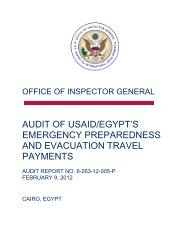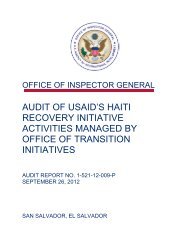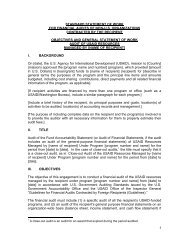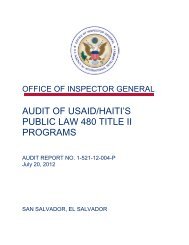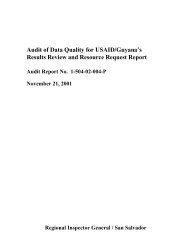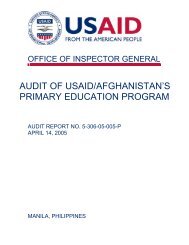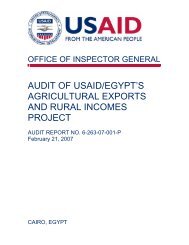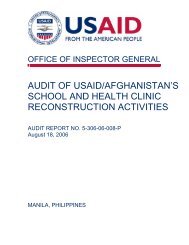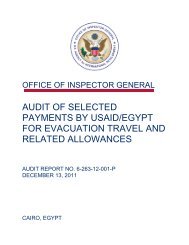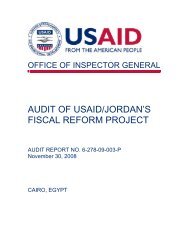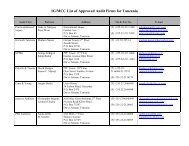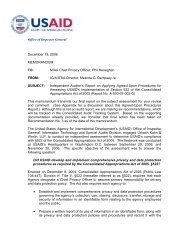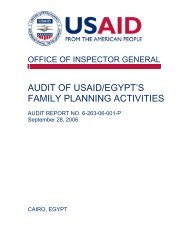USAID OIG Afghanistan and Pakistan Oversight Report, April-June ...
USAID OIG Afghanistan and Pakistan Oversight Report, April-June ...
USAID OIG Afghanistan and Pakistan Oversight Report, April-June ...
- No tags were found...
Create successful ePaper yourself
Turn your PDF publications into a flip-book with our unique Google optimized e-Paper software.
In response to <strong>USAID</strong>/<strong>Afghanistan</strong>’s request, <strong>OIG</strong> conducted this review to determine what opportunities<strong>USAID</strong> <strong>and</strong> contractor staff members had to learn of fraudulent activities at Kabul Bank through <strong>USAID</strong>’sEconomic Growth <strong>and</strong> Governance Initiative <strong>and</strong> its predecessor, the Economic Growth <strong>and</strong> Private SectorStrengthening Activity. The review also sought to determine how staff members learned of the fraud <strong>and</strong>what actions they took once they became aware of the fraud.The audit found that BearingPoint <strong>and</strong> Deloitte advisers who were embedded at DAB encounteredindications of fraud at Kabul Bank on a number of occasions over a span of 2 years before the run on KabulBank in early September 2010. However, they did not aggressively follow up on these indications. Also,Deloitte advisers did not report fraud indicators at Kabul Bank to <strong>USAID</strong>, <strong>and</strong> the mission did not have apolicy requiring contractors <strong>and</strong> grantees to report indications of fraud in host-government institutions orpossible problems that could reasonably be considered to be of foreign policy interest to <strong>USAID</strong> <strong>and</strong> the U.S.Government. <strong>OIG</strong> auditors also concluded that <strong>USAID</strong>/<strong>Afghanistan</strong>’s management of its task order withDeloitte was weak. If senior program managers <strong>and</strong> technical experts had been on staff at the mission,<strong>USAID</strong> would have had greater capacity to detect deficiencies in Deloitte's technical assistance activities, toquestion Deloitte advisers’ written <strong>and</strong> oral reports, <strong>and</strong> to delve more deeply into those reports, rather thanaccepting them at face value.In hindsight, Deloitte’s lead adviser acknowledged that Deloitte should have taken more aggressive actionsin November 2009, such as resuming participation by Deloitte’s advisers in onsite bank examinationsalongside the DAB examiners. This practice was suspended in November 2008 because an adviser receiveddeath threats. The lead adviser said that if Deloitte’s onsite assistance had restarted in November 2009, thefraud could have been detected earlier, <strong>and</strong> the magnitude of losses would have been smaller.Review of Cash Disbursement Practices Employed by Selected <strong>USAID</strong>/<strong>Afghanistan</strong> Contractors <strong>and</strong>Grantees (<strong>Report</strong> No. F-306-11-002-S, March 7, 2011)In late 2001, following decades of conflict, the financial <strong>and</strong> banking systems of <strong>Afghanistan</strong> weredevastated. <strong>Afghanistan</strong> had six licensed, state-owned commercial banks that were almost entirely based inKabul <strong>and</strong>, to a large extent, inactive. Besides lacking connectivity <strong>and</strong> reliable information on assets <strong>and</strong>liabilities, the banks did not follow generally accepted accounting st<strong>and</strong>ards. Vital functions of the centralbank were not defined or carried out, <strong>and</strong> <strong>Afghanistan</strong> lacked a credible, formal payment system. Lack ofconfidence in the banking system <strong>and</strong> uncertainties <strong>and</strong> difficulties faced by the population <strong>and</strong> the businesssector led them to rely almost exclusively on the hawala money transfer system, an informal network ofcash brokers who operate based on trust <strong>and</strong> reputation.<strong>OIG</strong> examined the cash disbursement practices of ten <strong>USAID</strong> contractors <strong>and</strong> grantees. Selected contractors<strong>and</strong> grantees represented about 42 percent of <strong>USAID</strong>/<strong>Afghanistan</strong>’s total active awards ($3.4 billion) <strong>and</strong>included six of the mission’s program areas: infrastructure, democracy <strong>and</strong> governance, education, health,economic growth, <strong>and</strong> stabilization in support of the U.S. Government’s counterinsurgency strategy. Usingan <strong>OIG</strong> risk assessment of <strong>USAID</strong>/<strong>Afghanistan</strong>’s contractors <strong>and</strong> grantees, we evaluated internal controlsover cash disbursements, performed a walk-through of the process for cash voucher payment, reviewed ajudgmental sample of cash vouchers <strong>and</strong> supporting documents, identified areas for improvement, <strong>and</strong>noted best practices employed.<strong>USAID</strong> <strong>OIG</strong> <strong>Afghanistan</strong> <strong>and</strong> <strong>Pakistan</strong> <strong>Oversight</strong> <strong>Report</strong> 75



